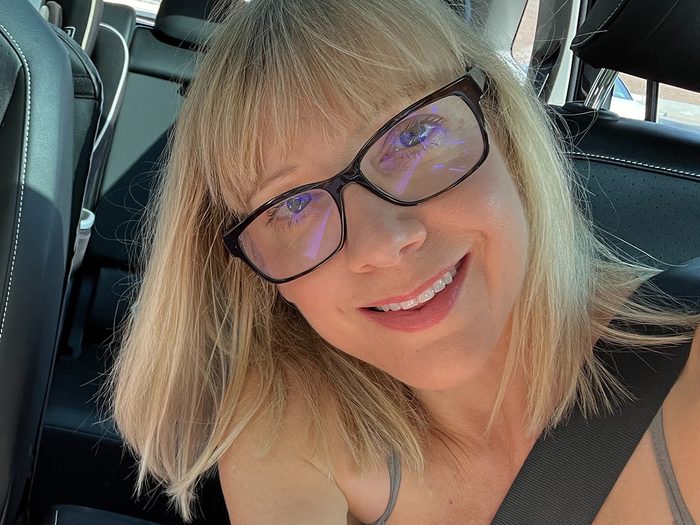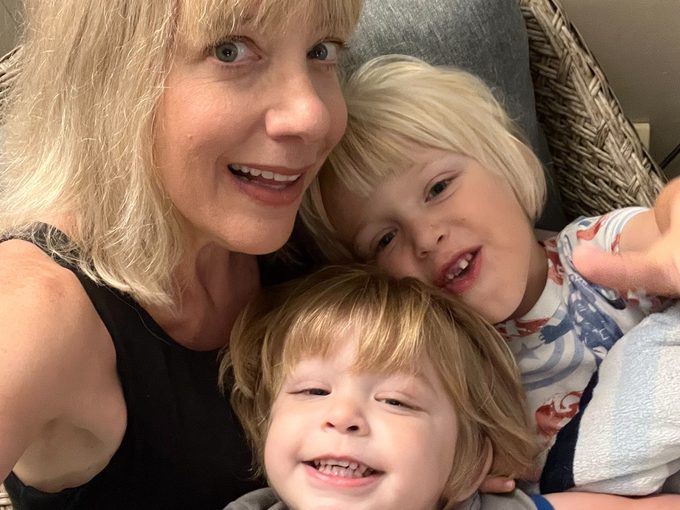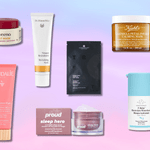After Cancer, Getting Botox and Fillers Made Me Feel Empowered

It’s not vanity, it’s not about ageism, and it’s not because of the patriarchy—it’s my choice.
I was about 14 months into my breast cancer treatment when I caught a glimpse of myself in a store mirror one day and noticed my skin looked different: Dull and very dry. It was also less elastic.
I was probably being too self-critical. It had been a rough year, to say the least: a new baby and the sleep deprivation that comes with it, and then a lump discovered when my baby was only 9 months old. I quickly had a double mastectomy, followed by chemically-induced menopause, with a shot every month suppressing my ovaries.
I had been relieved when the pathology results after my mastectomy showed the cancer hadn’t spread, but my oncologist said that going forward, the best line of defense for this type of hormone-driven breast cancer was the monthly shot, plus a daily pill (called an aromatase inhibitor) that would essentially consume any stray estrogen roaming around in my body. I was only 41.
I was lucky to evade most of the worst menopause symptoms—no hot flashes, no mood swings. (And a good lube helped with any vaginal dryness during sex.) But my bones did start to weaken from the lack of estrogen, and my vision started to rapidly deteriorate, cataracts and all. I was aging, and fast—and it scared the sh*t out of me.
Every time I scrolled through photos on my phone, I was taken aback by how much older I looked. My skin had gone from plump to sagging in record time. At my annual dermatology appointment, I mentioned something about this to my doctor and he explained how the depletion of estrogen can have an extreme result on the skin. “Unfortunately, Sarah, menopause is when a woman’s skin changes the most,” he told me as he inspected a mole on my arm.
I had to get in front of this. Cancer had taken so much from me already: my breasts, my eyelashes, my ability to carry another baby (we would go on to use a gestational surrogate to have our second child). It was time for me to be proactive.

I explored some non-invasive skin-tightening spa therapies and made an appointment for Morpheus8, the intense micro-needling radio-frequency therapy that promises to improve facial contours. It was getting a lot of attention (celebs swear by it), so of course I was game. After the first session I could already see the improvement in my skin and I felt better about myself than I had in a long time. It wasn’t cheap—I am privileged to be able to afford it—but I knew my mental health would pay the price without it.
A few months later, I saw an ad for something called Forma, another newer non-surgical procedure that would also use radio-frequency, along with thermal energy, to firm skin. I travelled across town to an upscale clinic that specializes in these bougie skin-tightening procedures. An hour later, I left there glowing, like I had just completed a workout.
I also purchased an at-home skin-toning device called NuFace. (Damn you Instagram, and your ads!) When I read that Jennifer Aniston herself was a fan, and actors are routinely gifted these micro-current devices in awards-show swag bags, I decided to “add to cart,” and pulled out the Amazon gift card I had gotten for my birthday. (At $120, this gadget felt like a steal.) It comes with a hydraulic acid gel (kind of like what’s used during an ultrasound) that you apply all over your face to help activate the micro-currents. The company claims that all it takes is five minutes a day gliding this little wand over your face and you’re on your way to a sculpted jawline and lifted skin.
While this device can’t begin to deliver results similar to in-office med-spa sessions, I do look forward to my late-night ritual with my—ambitiously named—NuFace. This act of self-care is just for me: Sitting on the side of the bathtub, listening to my favourite podcast while my two kids sleep peacefully in the next room, the portable micro-current device gliding over my skin, I feel… excited. I eagerly inspect my face after each treatment, impressed with how plump and refreshed my skin looks, even if just for a few hours.
Before cancer, the idea of something like Botox seemed ludicrous to me: Who would inject poison into their bodies to get rid of a wrinkle? But after you’ve been through cancer treatment and regularly ingest or inject various (lifesaving) drugs anyway, you are less precious about so-called toxins. After going through what I went through, I see Botox as a very solid means to an end.
The first time I tried it, the effects were so subtle that not one person even noticed. Even my husband just tends to think I looked happy and revived after any of these procedures. But I feel better, which is all that really matters. I do find myself omitting the details of my appointments with some of my close friends and family, who typically roll their eyes whenever I’ve mentioned I was getting something as ordinary as a facial. I’ve never tried to intentionally deceive them, and I am not ashamed of how much money I’ve poured into my skincare regimen—I just haven’t wanted anyone else to diminish my joy.
I used to be worried that some people may think all of this is pure vanity, or that I should just be grateful I’m alive. But I don’t think there’s anything wrong with wanting to replenish some of what was lost after my diagnosis. (And, for the record, I don’t think it takes cancer or chemically-induced menopause to justify or warrant the cosmetic choices you make when it comes to your own body.) I’m not weak for caring about how I look—it’s empowering.
Down the line, I’m not opposed to taking more invasive approaches either, such as plastic surgery. I’ve already had the mastectomy, a C-section, and breast reconstruction surgery, so it doesn’t intimidate me at all.
It’s true that these days, embracing the aging process is arguably more en vogue. Gen X celebrities such as Naomi Watts (54) now share openly about the skin changes that come with menopause. Courteney Cox, 58, has gone on the record about overuse of facial fillers and regretting how “strange” she looked at one point. Then there was Justine Bateman, who recently made headlines simply for being proud of how she looks at 57, aging “naturally” and refusing cosmetic procedures. I truly think that’s awesome—but that’s her path, not mine.
A couple years ago, on my 43rd birthday, I treated myself to my first filler injection. After the nurse finished, she handed me the mirror to review her work. I saw a glimpse of the woman I used to be, from a few years back, before cancer—and it was the best birthday present ever.
Next: Jeanne Beker on Finding Community and Support Through Her Breast Cancer Diagnosis




